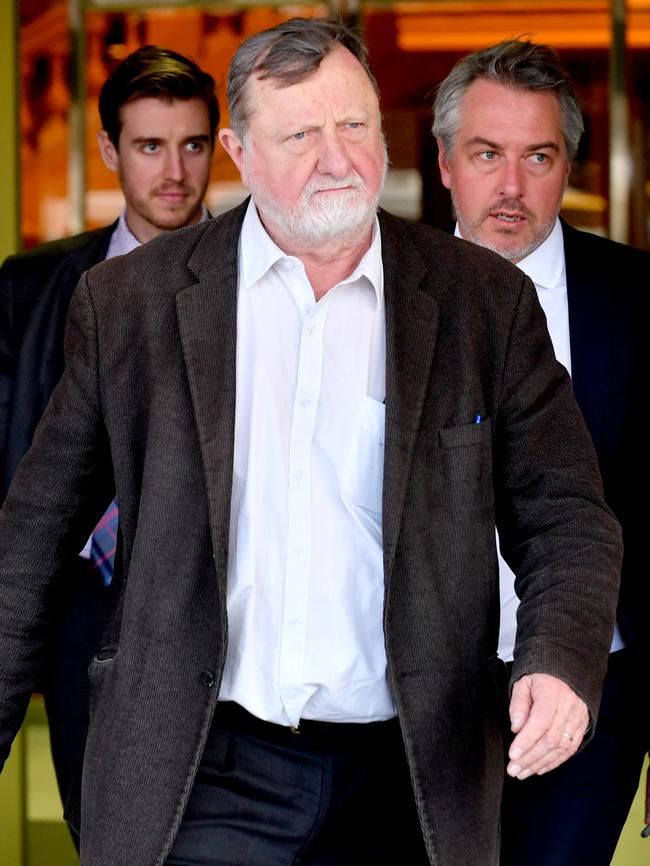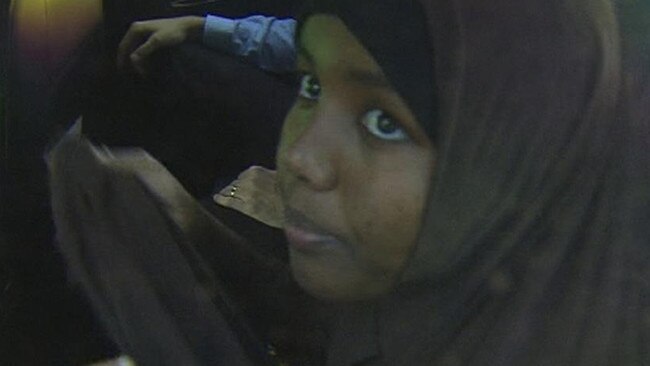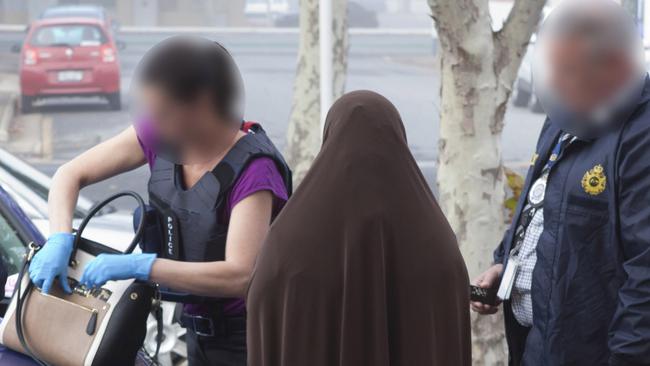Zainab Abdirahman-Khalif trial: Defence closing address warns jurors over ‘spin’ on evidence
JURORS in the trial of an Adelaide woman accused of swearing loyalty to the Islamic State terror group must not be swayed by mere suspicion nor “overawed” by the “spin” put upon the evidence by Federal authorities, defence counsel says.
- Jurors told ‘expect gruesome, graphic footage’ in IS trial
- Alleged IS member ‘had $170 and one-way ticket to Turkey’
- Accused told friend ‘they caught me red-handed’, IS trial told
- Expert can’t prove IS propaganda was deliberately downloaded
- Student claimed IS connection was ‘a coincidence’
- IS verdict ‘must come from mind, not heart or gut’, jurors told
JURORS in the trial of an Adelaide woman accused of swearing loyalty to the Islamic State terror group must not be swayed by mere suspicion nor “overawed” by the “spin” put upon the evidence by Federal authorities, defence counsel says.
The Supreme Court has heard the actions of Zainab Abdirahman-Khalif could be explained just as easily by a “stupid, childish and impulsive” decision by a woman who is not “worldly” to “ chuff off” overseas without her parents’ knowledge.
On Thursday, barrister Bill Boucaut SC gave his closing address in defence of former nursing student Zainab Abdirahman-Khalif, who has denied taking steps to become a member of the organisation and communicating with its members.

Mr Boucaut told jurors IS was a terrorist organisation “that fosters violence, that fosters murder, in the name of religion” and had “no place in our democracy, or anywhere else”.
He said that, during the trial, prosecutors had “bulldozed” the evidence at the jury — but that was no guarantee it was correct, nor proof of his client’s guilt.
“Do you know what it (the evidence) all means, ladies and gentlemen? They (the prosecution) put their spin, their point of view, on each particular piece of evidence,” he said.
“Do not be overawed by this constant mantra, you work it out for yourselves.”
Abdirahman-Khalif, 23, of Mansfield Park, has pleaded not guilty to one count of being a member of a terrorist organisation between 2016 and 2017.
Prosecutors have alleged she was in contact with a three-woman terror cell in Kenya that staged an attack on a police station.
They have further alleged she tried to leave SA for Turkey, without her family’s knowledge and with just $170, to join the organisation.
Previously, the court heard she had IS propaganda videos, including beheadings, on her phone — experts cannot, however, prove she deliberately downloaded that material.
In his closing address, prosecutor Chris Winneke SC urged jurors to put aside emotional reactions — both positive and negative — and hand down a verdict based on the evidence.
On Thursday, Mr Boucaut said Abdirahman-Khalif was “not a second-class citizen” because she faced “allegations that might evoke some emotion” as terrorism was “something we all abhor”.
He urged them to put aside personal prejudices and “things such as ban the burqa” when arriving at their verdict.
“She is deeply religious, she has a deep interest in religion (but) this trial is not about a religion, it’s about a terrorist organisation,” he said.

“These sorts of things have got no place in the way you look at the evidence in this case.”
Mr Boucaut conceded jurors may have suspicions as a result of the trial but they did not amount to proof beyond reasonable doubt — without which there could be no conviction.
“You might get to the stage where you think the accused is probably guilty, probably a member of a terrorist organisation, that she probably took steps to become a member,” he said.
“Well, let there be no misapprehension about this: if you come to that conclusion... then your verdict would be ‘not guilty’ because ‘probably guilty’ is nowhere near ‘guilty beyond reasonable doubt’.”
He reminded jurors that, at Adelaide Airport, Abdirahman-Khalif had told authorities she wanted to go to Turkey and Syria to join in on aid work and relief, saying “basically, I like to help people” but her family “won’t let me go”.
That, he said, might explain her lack of luggage and cash.
“You might think this young lady is not particularly worldly … she may well not have wanted her parents to know what she was up to … secrecy is probably no real big deal here,” he said.
“It would not be the first time that a young person has decided to do something incredibly stupid, incredibly impulsive, without wanting mum to know about it … it’s hardly a nefarious thing to do.
“If the family was then to find out (while she was overseas), they would usually help … you know what families do if young people chuff off — they are generally supportive of wayward kids. The lack of kit doesn’t really mean anything at all.”

Mr Boucaut said prosecutors had ignored any aspect of the matter that did not “fit their case concept”.
“There’s not the slightest hint of evidence to suggest she had contacts to get her across Turkey,” he said.
“How was she going to get across the Syrian border? Where is the evidence she was going to go anywhere other than Istanbul? There’s nothing but speculation by the prosecution.”
The trial, he said, had made it clear Australian Federal Police and Border Force could access and interrogate information from dozens of sources available to them, including Abdirahman-Khalif’s digital devices.
“(But there is) no evidence whatsoever of contacts, of plans, of travel arrangements to get across Turkey — just nothing there at all, no hint, nothing,” he said.
“You are merely invited to speculate, and it points equally to some childish, impulsive decision to take off without any real plan, maybe later send an SOS to mum.
“You might ask yourselves: is this young woman that good at planning and then hiding it, when you know the resources that can look into what she has been up to?”
He said prosecutors had dismissed much of the material on Abdirahman-Khalif’s devices as “irrelevant” to the case, meaning what jurors had seen was “a mere drop in a vast ocean” of data she had possessed.
“Computers have a vast quantity of material - do you people know what’s on your computer? Do you know everything that goes into your computer?” he asked.
“(The material) is nothing more than a little bit of suspicion, a little bit of spice... it means nothing at all... if there was a plan, you would see a heck-load more material.”
Mr Boucaut suggested jurors should hear “a bit of clanging of the warning bells” about allegations Abdirahman-Khalif was “in bed with” terrorists in Kenya, given she was was heading to Turkey and Syria.
“Why, in heaven’s name, was she not going to Kenya? Why is she going to Turkey? Something is not quite right here,” he said.
He said there was “no evidence whatsoever” his client had disseminated IS’ propaganda, as the organisation required its members to do.
“Where is the evidence of her beating her chest, banging the drums, preaching the gospel according to IS?” he asked.
“The evidence is resoundingly silent on that one.”
Mr Boucaut asked jurors to listen carefully to recordings in which, prosecutors allege, Abdirahman-Khalif recite an oath of loyalty to IS.
He said her school reports did not indicate fluency in Arabic, and that she was “parroting” a recorded oath.
“Ask yourself, is she understanding it? Is she understanding the importance of it? That’s a big, big question mark,” he said.
The jury is expected to retire on Monday to begin deliberating its verdict.

